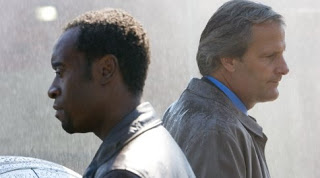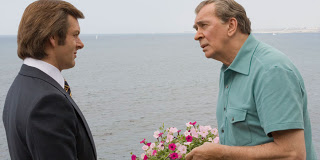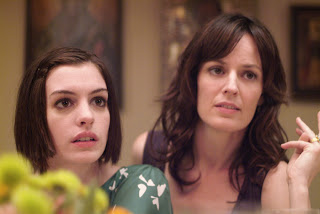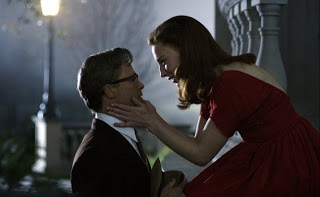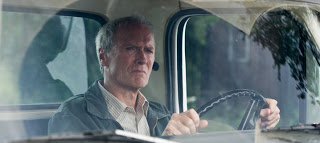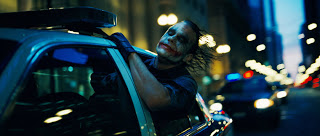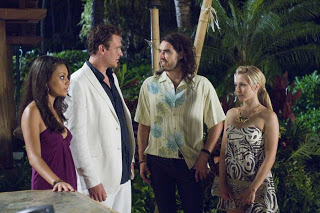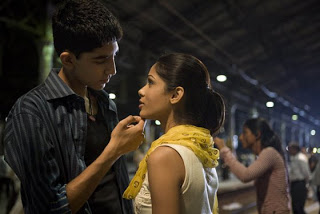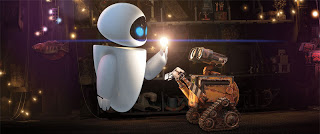I considered devoting a detailed post to the recent Oscars telecast, but there’s really no point; while I’m more than happy to convey my esteemed thoughts on movies, TV shows, and other forms of populist entertainment, I can’t quite motivate myself to write about an awards ceremony. In terms of my predictions, I correctly hit 14 of 21 categories for a score of 67% – not terrible, but certainly not good, especially in a year with an established frontrunner. Most of my upset picks in the technical categories proved to be more idiotic than sneaky; I won’t beat myself up over the Sound categories or Departures winning for Foreign Language Film, but going with The Curious Case of Benjamin Button over Slumdog Millionaire for Original Score was just wishful thinking, and I missed on both big 50-50 areas (Actor and Original Screenplay). Poor form.
(On the plus side, multiple people informed me that the Manifesto helped guide them to strong finishes in their respective Oscar pools. I’m happy to provide assistance, but they obviously must have made some shrewd adjustments to a few of my more dubious selections. In my own pool with weighted scoring, I finished seventh out of 12 and lost to my sister by one fucking point. Seriously poor form.)
So instead, let’s focus on something positive, namely my Top 10 list for 2008. I acknowledge that it’s utterly foolish to rank movies in a rigid order (ask me to provide the same list six months from now, and it’s inevitable that a few films will have shifted), but it’s fun nevertheless. Sadly, however, this year I found the task somewhat sobering, simply because I just didn’t see that many terrific movies in 2008. This pains me a great deal, as I despise the gloomy naysayers who constantly grouse about the quality of contemporary cinema and long for the glory days when photography was black-and-white, computer-generated imagery was nonexistent, and movies in general were a whole lot more boring. But after an astonishing 2007 that forced me to expand my annual list of the 10 best films to 15, the sad truth is that this year I struggled to reach double digits.
Don’t get me wrong: I saw plenty of good, entertaining movies this year. But few had that must-see quality, that pizzazz that makes me excitedly gush to people, “You have to see this!”. In fact, of the films on the following list, I’d only classify four as being categorically great. That number itself isn’t particularly low – it’s rare that I see five unilaterally excellent motion pictures in a given year – but usually it’s supported by 10-15 stellar additional films. This year’s bench just wasn’t as deep. And that’s kind of depressing.
But even if there weren’t a lot of movies to love at the cinema in 2008, there were still plenty worth seeing. All of the films on the following list have their own singular qualities, and while I enter the 2009 moviegoing season with the hope that it features an improved roster, I look forward to watching all of these movies again on Blu-ray. Here goes:
10. Revolutionary Road. I probably would have hated this movie if I hadn’t liked it so much. A brutally depressing tale of a chaotic marriage, Sam Mendes’ film is almost discordantly beautiful, featuring breathtaking imagery from master cinematographer Roger Deakins. Yet it is also unrelenting in its bleakness and, more troubling, its realism. Leonardo DiCaprio and Kate Winslet – unequivocally two of the finest actors working today – essay two highly identifiable people whose lives are torn apart by … what? Life itself, I suppose, and that’s the most frightening aspect of Revolutionary Road. There are no contrivances, no dubious plot points, no imaginative reaches. There is only a simple marriage and all of the desperation and pain that it entails. I can’t say I sympathized with either of the protagonists in the movie (which may be why its emotional impact is less forceful than that of Mendes’ debut film, American Beauty), but I certainly felt the intensity of their pain.
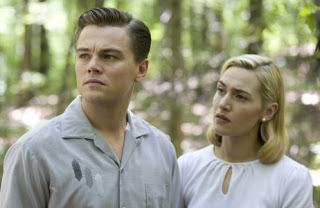 9. Traitor. It grieves me that Overture Films chose to release Traitor in the dog days of late-August, where it floundered at the box-office despite strong critical reviews. We can only hope that the movie finds an audience on Blu-ray because it’s one of the strongest terrorism-slanted pictures of the decade. Intelligently plotted and ethically intriguing, Jeffrey Nachmanoff’s film is less an action thriller than a thoughtful examination of the current sociopolitical climate of today’s fear-ridden world. Supported by a number of complex characters and featuring a rich, three-dimensional lead performance from Don Cheadle, Traitor asks important questions while refusing to provide easy answers. (Ridley Scott’s Body of Lies serves as an excellent companion piece for the more action-oriented.)
9. Traitor. It grieves me that Overture Films chose to release Traitor in the dog days of late-August, where it floundered at the box-office despite strong critical reviews. We can only hope that the movie finds an audience on Blu-ray because it’s one of the strongest terrorism-slanted pictures of the decade. Intelligently plotted and ethically intriguing, Jeffrey Nachmanoff’s film is less an action thriller than a thoughtful examination of the current sociopolitical climate of today’s fear-ridden world. Supported by a number of complex characters and featuring a rich, three-dimensional lead performance from Don Cheadle, Traitor asks important questions while refusing to provide easy answers. (Ridley Scott’s Body of Lies serves as an excellent companion piece for the more action-oriented.)
8. Frost/Nixon. There aren’t any firearms brandished in Frost/Nixon, but in a way it feels like more of an action movie than Traitor; Ron Howard is no stranger to thrillers, but this strangely represents his most invigorating film since Ransom. Rather than drown the proceedings with excessive archival footage, he emphasizes the historical magnitude of David Frost’s interviews with the disgraced president through tense conversations, transforming what could have been a straightforward docudrama into a heavyweight duel rife with suspense. The overall production is masterful – Frank Langella and Michael Sheen are stupendous, the editing is incredibly precise, and the plot builds breathlessly to a gripping climax. Words may be the main characters’ weapon of choice, but their clashes are as kinetic as any on-screen martial arts battle.
7. Rachel Getting Married. Jonathan Demme certainly refuses to be confined to a single genre – he’s made thrillers (The Silence of the Lambs), music documentaries (Neil Young: Heart of Gold), and character-driven dramas (Philadelphia). But his latest film has all of the trappings of a movie I wouldn’t expect to like. Shot digitally on handheld cameras in a manner that echoes the Dogme 95 movement that produced gems like The Celebration and disasters like Dancer in the Dark, Rachel Getting Married is decidedly lo-fi, and at first I feared it would creak under the weight of its own artistic pretensions. Thankfully, however, the self-indulgent nature of the style blends into the background as the characters come to the fore, and we can observe in peace a family at war. Despite the low-budget style, Demme’s production maintains exquisite verisimilitude, and his characters’ emotions ring with truth. The people in front of the camera aren’t necessarily extraordinary individuals, but they are individuals – each is fully unique and fully developed. Bill Irwin infuses the patriarch with beautiful, uninhibited empathy, while Anne Hathaway’s Kym is one of the most memorably haunted and haunting people I’ve ever met at the movies. Rachel Getting Married may be shot in the method of a throwaway, but its story of destruction and compassion have remained in my mind with unmistakable clarity.
6. The Curious Case of Benjamin Button. Here is another film that lingers long afterward, although in this case the production is simply immaculate. David Fincher has cemented his position within the Hollywood A-list with a spectacular technical achievement – every frame of the picture is meticulously constructed and beautifully shot. But it’s the aching loneliness of the story that elevates The Curious Case of Benjamin Button to the realm of epic. The movie may take its time, but it’s fitting that a meditation on the fragility of life and the slippery nature of human connection be permitted to breathe. There is plenty of wondrous imagery to be found in the film, but there is also profound sadness, most notably in Cate Blanchett’s unforgettable performance. “I was thinking about how nothing lasts, and what a shame that is,” Benjamin tells Daisy around the film’s halfway point. “Some things last,” she responds. She’s right – the movie surely will.
5. Gran Torino. Looking back on Gran Torino, I’m almost ashamed that I enjoyed it as much as I did, given its ham-fisted storyline and emotional bluntness. But there’s something to be said for Clint Eastwood’s seductive filmmaking style, which draws viewers in and obscures plot contrivances from view. Instead we focus on the intimacy of the film’s characters, most obviously Eastwood himself as a hard-edged retiree whose most vivid quality is his universal disgust toward the rest of humanity. Gran Torino’s story of that man’s redemption, as well as the tentative blossoming of the friendship between him and the Hmong family that takes up residence beside him, could have turned saccharine under the leadership of a lesser filmmaker, but in Eastwood’s hands the developments feel entirely credible. More importantly, they’re moving; Eastwood engenders true sympathy for his characters, and we become completely invested in their fight for salvation amidst the harsh realities of American life. The film’s ending is one of such delicate poetry that I couldn’t help but smile. Eastwood is tackling a more ambitious project in 2009 (Nelson Mandela as played by Morgan Freeman – hello Oscar!), but Gran Torino proves he’s still a master even on a small scale.
4. The Dark Knight. I was never a huge Batman fan, and although I enjoyed Christopher Nolan’s franchise reboot Batman Begins, I wasn’t fully on board with it. But The Dark Knight is – to paraphrase Liam Neeson from the earlier film – something else entirely. It’s simply electric. It barrels out of the gate with a showstopping opening, and then it just doesn’t slow down. The movie runs roughly 150 minutes, but it proceeds at a pace so relentless that I would have thought it unsustainable. The “edge of your seat” cliché was created for a film like this; throughout the film I simply could not relax, so intense was the suspense. Technically, the production is superlative – the design is fantastically Gothic, the photography dazzles, and the action scenes are exhilarating. Furthermore, the script is top-notch, featuring fully realized characters tackling intriguing moral questions, while Maggie Gyllenhaal introduces a legitimate emotional component (which was sorely lacking in Batman Begins). The Dark Knight is proof that movies can evolve, can push the envelope, can keep getting better. It may not have received a Best Picture nomination, but it will undoubtedly resonate with audiences for years to come.
3. Forgetting Sarah Marshall. There are certain times when you give yourself over to a movie completely. I can’t remember when it happened to me in Forgetting Sarah Marshall – it was probably after Jason Segel had to pause to consider his response when a woman asked him, “Do you want to gag me?” but before Russell Brand’s impromptu rendition of the romantic charmer “Inside of You” – but it definitely happened. And I was so much happier for it. There are comedies that land a few cheap laughs and no lasting impression, and then there are comedies that truly care about their characters and derive their humor from shrewd plotting and sharp dialogue. This is the latter. Part sad-sack redemption story, part love story, part “I cannot stop fucking laughing because this movie is so damn funny” story, Forgetting Sarah Marshall defies any single label. It achieves greatness not because of the talent of its cast or the wit of its script but because it is made with such purity of feeling, and it effortlessly transfers that feeling to its audience. We laugh at Peter Bretter’s situation, but we also feel compassion for his plight, yet Forgetting Sarah Marshall is so marvelously grounded in reality that it avoids feeling cloying. Instead, it just seems true. So perhaps it does earn a single label after all: It’s a great movie.
2. Slumdog Millionaire. For the record, this is the third time in the last six years that the #2 film on my Top 10 list has won Best Picture (the others being The Departed and The Lord of the Rings: The Return of the King); maybe I should just slot Harry Potter and the Half-Blood Prince in at #2 in 2009 to boost its chances. But Slumdog Millionaire didn’t need my help. The movie is so joyous and effervescent that it radiates with pure happiness. Curiously, it also dabbles in ugly circumstances with some frequency, but that ugliness is conquered by its heartwarming spirit and fearless kineticism. Slumdog Millionaire thrusts itself forward and backward in time, propelling itself heedlessly while simultaneously maintaining an eye on sound narrative structure. The movie’s screenplay is undeniably clever, and its energy is indomitable, but its characters are what make it memorable. The joy derived from its phenomenally entertaining climax is not the product of calculation – it has been earned. We invest ourselves immediately into the lives of these people, and as we watch their perilous journey, we yearn for their success. Slumdog Millionaire, for all its craft, is foremost a vision of hope, a reminder that we all should never cease to dream.
1. Wall-E. I said it all here, but it’s worth emphasizing: Take the pure thrill I felt while watching The Dark Knight, and the laughter I experienced during Forgetting Sarah Marshall, and the joy that coursed through me during Slumdog Millionaire, and you can almost begin to have an idea of how I felt while watching Wall-E. It just has everything. Brilliantly detailed animation, abundant good humor, a remarkably original story, tender pathos, and two of the most iconic screen characters ever created – it’s all there. The delight it generates is pure and unremitting. You often hear people fondly refer to a work of art that “made them feel like a kid again” without really meaning it. Wall-E generates that kind of power. Every time I watch it, it makes me feel like a child again. It is no mere movie. It’s movie magic.
Jeremy Beck is the editor-in-chief of MovieManifesto. He watches more movies and television than he probably should.

